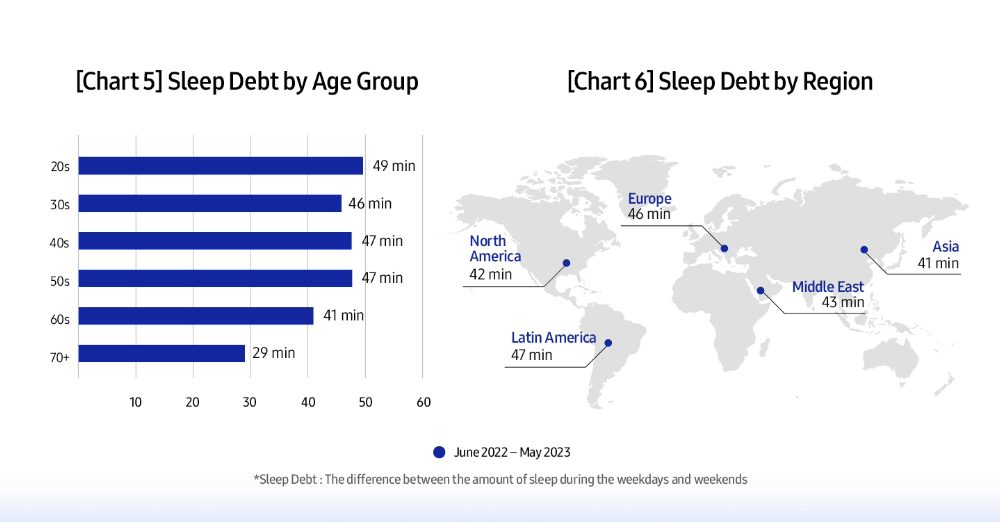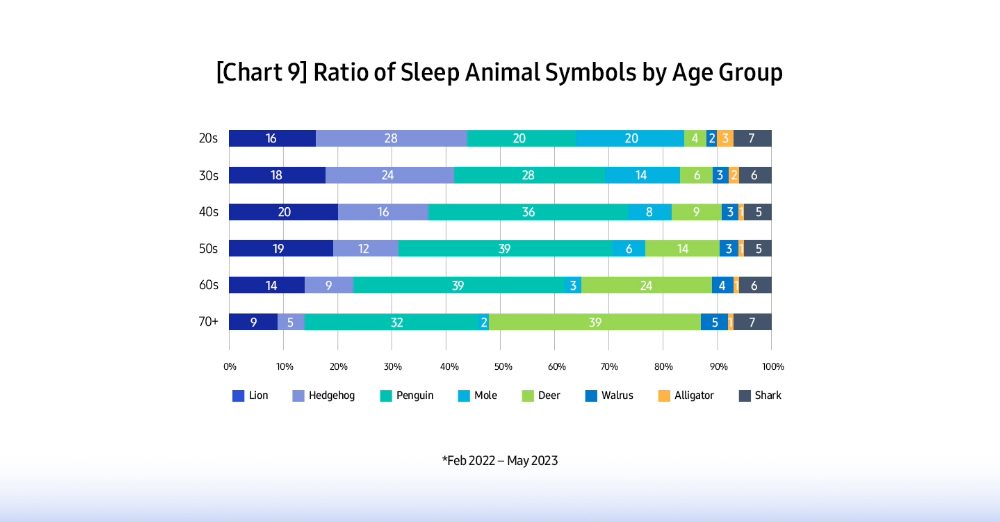Have We Been Sleeping Well? Samsung Answers the Age-Old Question With the Global Sleep Health Study
on October 26, 2023
Today, more and more are prioritizing sleep as it relates to health. The growing interest in sleep is clear from recent trends observed with the Samsung Health app. Over the past two years, there has been a 182% increase1 in the number of users who actively tracked sleep2 at least once a week for a year. Yet despite this, the question remains: have we been sleeping well?
Samsung set out to answer this question by conducting one of the largest single sleep health studies3 ever undertaken — analyzing 716 million nights of sleep behaviors from Samsung Health users worldwide. Though interest in personal sleep health has been skyrocketing, the unfortunate reality is that the quality of sleep people get each night is, in fact, declining. The world is facing a sleep dilemma.
The World Sleeps Less — and Less Efficiently
Across the globe, average sleep duration has fallen from 7 hours and 3 minutes to 6 hours and 59 minutes globally — slipping below the essential 7-hour threshold recommended by the National Sleep Foundation. (Chart 1)

Another concerning aspect is the increase in awake time during sleep, leading to a decline in sleep efficiency — a key factor in sleep quality that is tracked by calculating the ratio of actual time asleep to the total time spent in bed each night.
This pattern was not isolated to any specific demographic or region. There was a reported decrease in sleep duration and efficiency across all sexes, age groups, and regions studied:
- Though sleep efficiency continues to trend downward for males, females experienced the most notable decreases over the past year. (Chart 2)
- Older demographics showed a greater decline in sleep efficiency. Notably, individuals aged over 70 experienced a decline nearly twice as much as that observed in those in their 20s. (Chart 3)
- North America witnessed the greatest decrease in sleep efficiency, while Asia maintained the lowest. (Chart 4)
- Outside of Europe and North America, all other regions had less than seven hours of sleep duration. (Chart 4)


Sleep Debt Highly Impacting Younger People
Inconsistent sleep patterns also impact sleep quality. Sleep debt — a measure of sleep inconsistency that indexes the gap between the amount of sleep during the weekdays counter to weekends — also negatively contributes to global sleep issues.
Sleep debt is highest among the young — those in their 20s had nearly double the sleep debt than those in their 70s: 49 minutes versus 29 minutes, respectively. (Chart 5) By region, Asia had the shortest sleep debt at 41 minutes whereas Latin America had the longest at 47 minutes. Globally, people are sleeping an extra 44 minutes on the weekends on average. (Chart 6)

Counting Penguins, Not Counting Sheep
In an effort to gain deeper insight into prevalent global sleep patterns, Samsung set out to analyze and categorize various types of sleepers into Sleep Animals.4 Each of the eight Sleep Animals represents a distinct sleep pattern with unique characteristics related to sleep duration, consistency, and awake time — all of which collectively influence sleep quality. (Chart 7)
Interestingly, the majority of individuals worldwide identified most closely with the sleep styles of “Nervous Penguins” comprising of one-third of participants. They maintain healthy circadian rhythms yet frequently experience interruptions during sleep, contributing to diminished sleep efficiency. This pattern aligns with the downward trend observed over the past year. (Chart 8)
- Older users saw higher percentages of “Cautious Deer,” meaning a person with shorter sleep duration and higher awake times. Almost 40% of those in their 70s had “Cautious Deer” as the Sleep Animal, which is almost 10 times more than those in their 20s. The ratio of the animal showed a consistent increase as the age group got older. (Chart 9)
- People in their 20s — in addition to higher representation of “Sensitive Hedgehogs” — also saw more “Sun Averse Moles” compared to older age groups. These categories, those who have problem with sleep consistency, became increasingly prevalent as the age demographic decreased as well. (Chart 9)



How Small Habits Can Deliver Quality Sleep
In addition to Sleep Animals, there are a suite of Sleep Coaching programs that aim to improve the quality of sleep. They are driven by the strong belief that forming small, daily habit changes can result in better sleep quality. It provides a month of motivational sleep coaching customized according to users’ unique animal sleep type right on their wrist — including, but not limited to getting out of bed quickly in the morning, having a regular wake-up time, being active during the day, and other positive habits.
To examine the effectiveness of the Sleep Coaching, Samsung analyzed how many users moved on to higher tier of Sleep Animal with coaching (Chart 10). For example, if you were “Alligator on the Hunt” in tier 3, it’s counted as effective when you move on to higher tier of Sleep Animal in tier 1 or 2. When we saw the results, it actually worked. An example of the effectiveness of Sleep Coaching resulted from the fact that Sleep Animals can evolve in positive directions with better sleep habits.
- Some users experienced better sleep quality the more they participated in Sleep Coaching. Every Animal saw higher improvement after 2 months of coaching than just 1 month.
- 94% of “Exhausted Shark” — the most substandard Sleep Animal designation defined by those who are visibly sleep deprived and yet cannot achieve quality sleep — saw improvement after just two months of Sleep Coaching.

Better sleep health is possible with just small habits. With Galaxy Watch6 series and Samsung Health, users can achieve healthier sleep with a better understanding of their own sleep patterns and personalized motivations and coaching.
To learn more about the Galaxy Watch6 series, please visit www.samsung.com/galaxy-watch.
1 A comparison was made between Samsung Health users’ data from January to May of 2021 and the same period of 2023.
2 Not intended for use in medical detection, diagnosis or treatment. Intended for general wellness and fitness purposes only.
3 Findings analyzed results from approximately 716 million nights of sleep collected between June 2021 and May 2023 via the Galaxy Watch series.
4 Requires sleep data of at least 7 days, including 2 days off.


